In KDD 2018, the "Little Ice Band" co-operated by University of Science and Technology of China, Soochow University and Microsoft won the best student paper in Research Track. Professor Tang Jie from Tsinghua University and Professor Liu Bing from UIC respectively won the Outstanding Sharing Award and the Innovation Award. In addition to the number of Chinese who received papers and participated in the conference, more Chinese scholars' names appeared in the organizing committee of this conference. Xinzhiyuan brought the highlights of the KDD18 conference as soon as possible.
It's another year of KDD.
This world's top academic event in the field of knowledge mining and data decision-making has almost become a gathering of Chinese in London.
According to statistics, among all the nearly 300 papers accepted by KDD this year, 189 were Chinese/Chinese authors, accounting for 64.5%.
The most critical level of conference organization managers is that of the 55 people in the KDD 2018 organizing committee, 20 are Chinese/Chinese, accounting for about 36%. Among them, one of the chairman of the conference is Yike Guo (éƒæ¯…å¯) from Imperial College London, while the vice chairman of the conference is associate professor Tang Jie of Tsinghua University. Among other members of the main committee, a large number of Chinese/Chinese names have also been seen, which reflects China's academic influence more than the acceptance of papers.
Character Award: Tsinghua Tang Jie won the Outstanding Contribution Award,
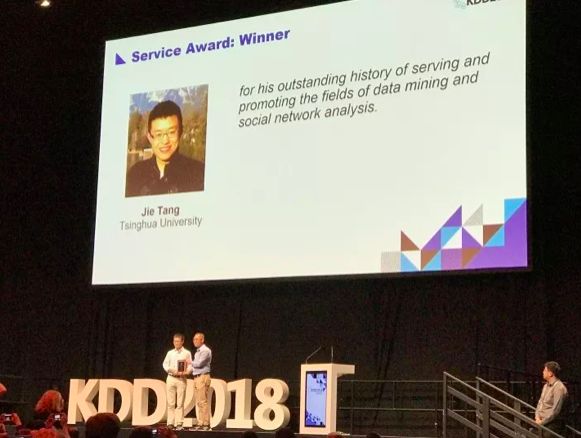
Associate Professor Tang Jie of Tsinghua University won the KDD Outstanding Contribution Award.
Another award that receives the most attention-KDD 2018 Innovation Award winner is no one else. It is Liu Bing, a fellow of ACM, AAAI & IEEE, and a professor of computer science at the University of Illinois interviewed by Xin Zhiyuan.
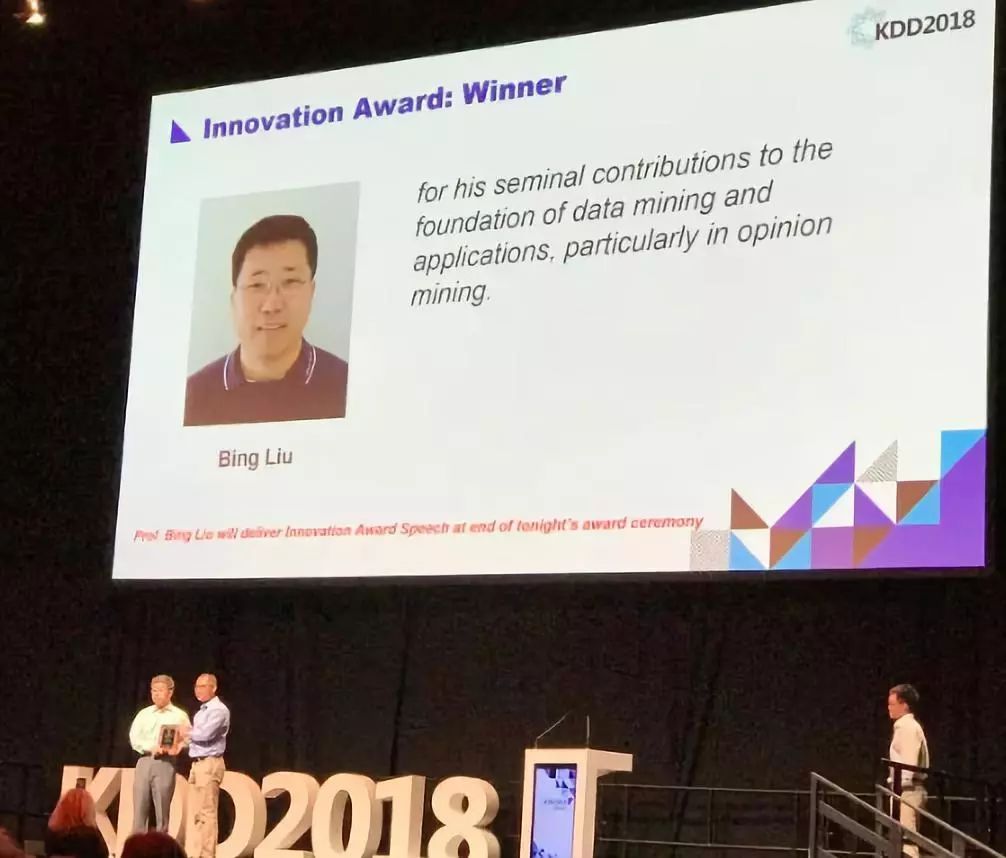
Best paper: China won the best student paper in Research Track
So, let's not say much, let's look at the best paper first.
Research Track Best Paper
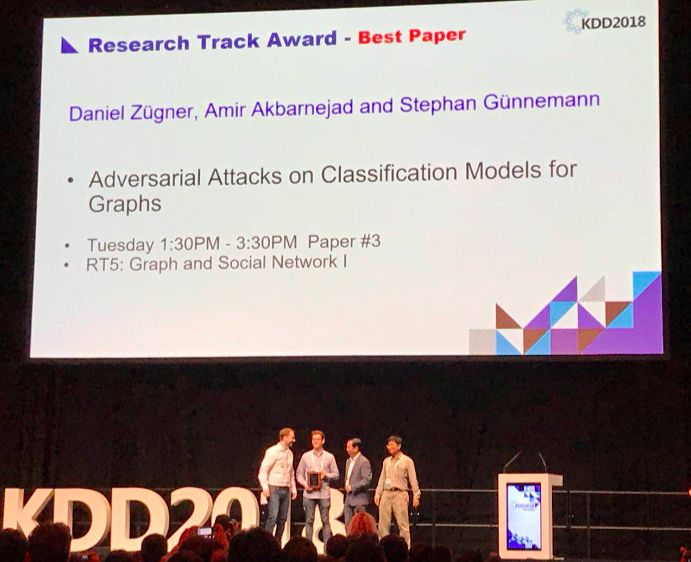
Adversarial attacks on classification models for Graphs
Adversarial attacks on graph classification models
Paper address: https://arxiv.org/abs/1805.07984
Author: Daniel Zügner (Technical University of Munich); Amir Akbarnejad (Technical University of Munich); Stephan Günnemann (Technical University of Munich)
Abstract: The graph deep learning model has achieved good performance in node classification tasks. Although there are more and more graph deep learning models, there is currently no research to explore their robustness to adversarial attacks. However, in areas where they may be used, such as the Internet, confrontation is common.
Are graph deep learning models easy to be fooled? In this work, we introduced the first research on adversarial attacks on attributed graphs, with special attention to models that utilize graph convolution ideas. In addition to the attacks during testing, we also studied more challenging poisoning/induced attacks, which were concentrated in the training phase of the machine learning model. We generate adversarial perturbations based on the characteristics of the nodes and the graph structure, so as to obtain the dependencies between instances. In addition, we keep important data features to ensure that these disturbances will not be noticed.
In order to solve the underlying discrete domain problem, we propose an effective algorithm Nettack that uses incremental calculations. Our experimental research shows that even with only a small amount of disturbance, the accuracy of node classification will decrease significantly. More importantly, our attack is transferable: the learned attack can be extended to other state-of-the-art node classification models and unsupervised methods, and it can be equally successful even if only a small amount of knowledge about the graph is given.
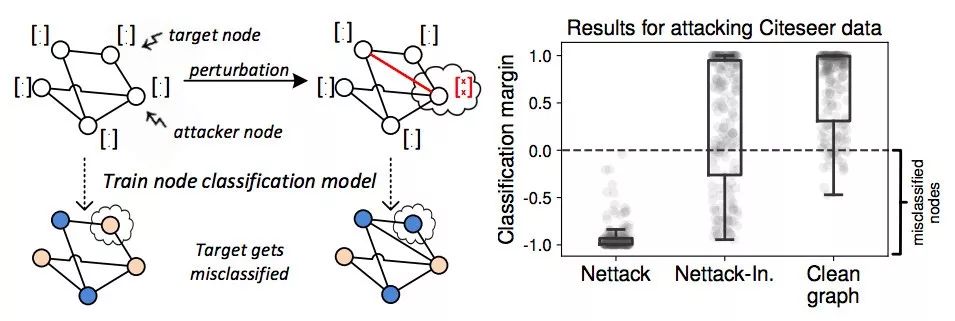
Figure 1: Small disturbances to the graph structure and node features lead to the wrong classification of the target.
Research Track Best Student Paper
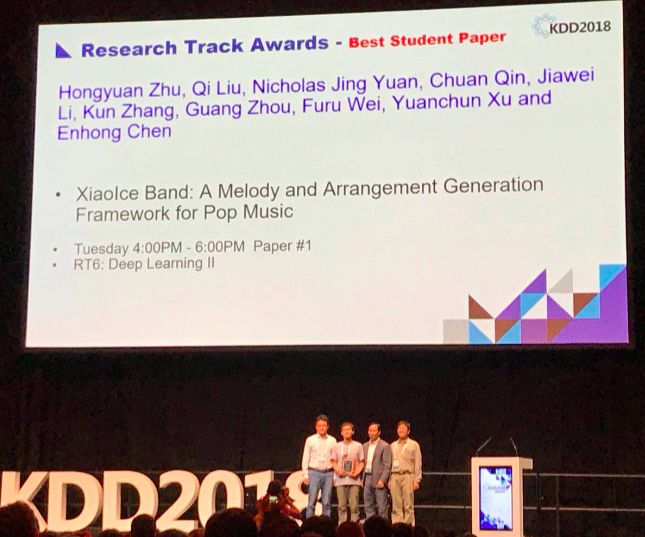
XiaoIce Band: A Melody and Arrangement Generation Framework for Pop Music
Little Ice Band: The Melody and Arrangement Framework of Popular Music
Paper address: http://
Author: Hongyuan Zhu (USTC); Qi Liu (USTC); Nicholas Jing Yuan (Microsoft); Chuan Qin (USTC); Jiawei Li (Soochow University); Kun Zhang (USTC); Guang Zhou (Microsoft); Furu Wei (Microsoft ); Yuanchun Xu (Microsoft); Enhong Chen (USTC)
Abstract: With the development of music creation knowledge and the increasing demand in recent years, more and more companies and research institutions have begun to study the automatic generation of music. However, the previous models have limitations when applied to song generation, which requires both melody and arrangement. In addition, many key factors related to song quality have not been well addressed, such as chord progressions and rhythm patterns. in particular. How to ensure the harmony of multi-track music is still a problem to be explored.
To this end, we have conducted a focused study on the automatic generation of popular music, in which we considered the influence of chords and rhythms generated by melody, as well as the harmonies of music arrangement. We propose an end-to-end melody and arrangement generation framework called "XiaoIce Band" (XiaoIce Band), which generates a melody track composed of several accompaniment tracks played by several instruments.
Specifically, we designed a chord-based cross-generation model of rhythm and melody (CRMCG) to generate melody with chord progression. Then, we propose a Multi-Instrument Co-Arrangement Model (MICA) based on multi-task learning. Finally, we conducted extensive experiments on a real data set, and the results proved the effectiveness of XiaoIce Band.
Research Track paper graphic, the acceptance rate is only 18.4%
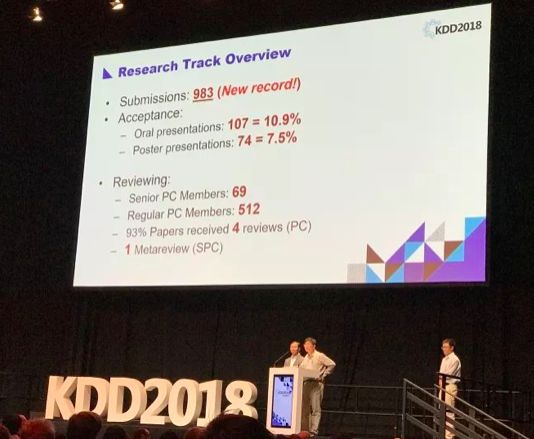
ADS Track Best Paper
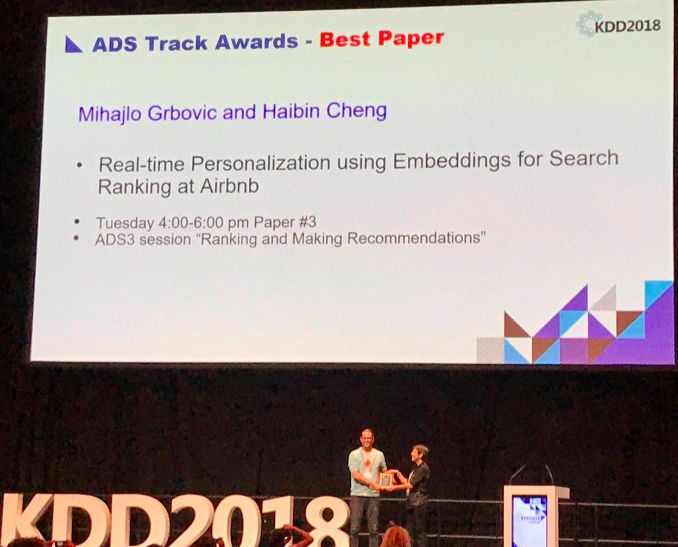
Real-time Personalization using Embeddings for Search Ranking at Airbnb
Real-time personalization using embedded search rankings on Airbnb
Paper address: http://
Author: Mihajlo Grbovic (Airbnb); Haibin Cheng (Airbnb)
Abstract: Search ranking and recommendation are the basic issues that major Internet companies pay attention to, including online search engines, content publishing sites and markets. However, despite some common features, there is no one-size-fits-all solution in this area. Because of the huge differences in the content that needs to be ranked, personalized, and recommended, each market has some unique challenges.
Airbnb is a short-term rental market, and its search and recommendation problems are also very unique. It is a two-sided market. At the same time, it is necessary to optimize the preferences of landlords and customers; users rarely book the same room twice. On the other hand, a room can only accept reservations from one guest on a specific date.
In this paper, we describe a listing and user embedding (Listing and User Embedding) technology, whose purpose is to achieve real-time personalization of search ranking and recommendation of similar items. These two channels can drive 99% conversion. The embedded model is specially tailored for the Airbnb market, which can capture the short-term and long-term benefits of customers and provide effective room recommendations. We conducted a rigorous offline test on the embedded model, then a successful online test, and finally deployed it to the production environment.
ADS Track Best Student Paper
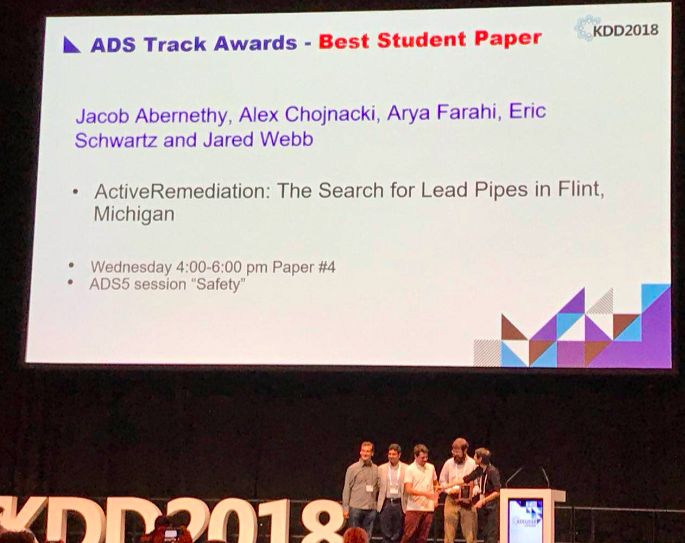
ActiveRemediation: The Search for Lead Pipes in Flint, Michigan
ActiveRemediation: Looking for lead water pipes in Flint, Michigan
Link to the paper: http://
Author: Jacob Abernethy (Georgia Institute of Technology); Alex Chojnacki (University of Michigan); Arya Farahi (University of Michigan - Ann Arbor); Eric Schwartz (University of Michigan); Jared Webb (Brigham Young University)
Abstract: In this paper, we detailed the ongoing work to detect lead and other hazardous metal pipelines in Flint, Michigan. After the increase in lead levels in residents' drinking water was detected, an incident of increased blood lead levels in children occurred in the area. The state and federal government ordered more than $125 million to replace water supply pipes.
Due to the lack of accurate records and the high cost of identifying pipeline materials buried in the ground, we have developed some forecasting and procedural tools to help search and remove lead infrastructure. In addition to these statistics and machine learning methods, we also describe our interactions with government officials when recommending inspections and replacements of houses, with a focus on statistical models that adapt to new information. Finally, based on the federal government’s discussion of increasing infrastructure spending, we discussed how our approach can be extended to cities other than Flint.
Best Doctoral Dissertation Lecture
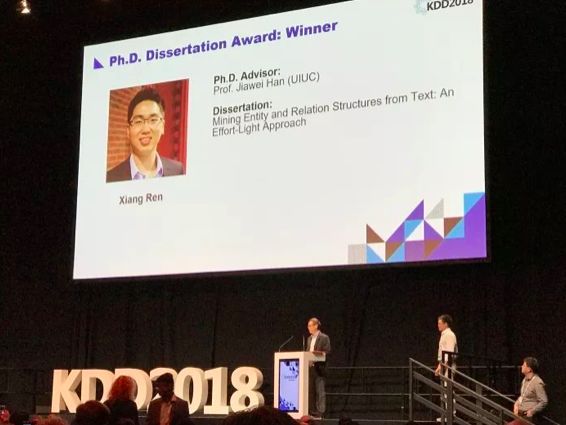
Classic Paper Award
Factorization Meets the Neighborhood: a Multifaceted Collaborative Filtering Model
Chinese: Factorization and nearest neighbors: multi-faceted collaborative filtering model
Author: Yehuda Koren
Organization: AT&T Labs-Research
Social Impact Research
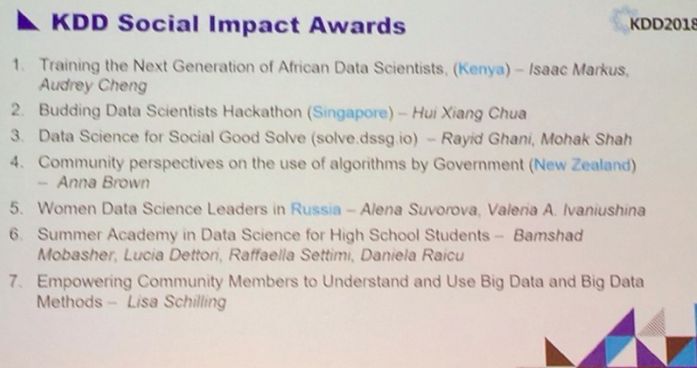
1. Training the Next Generation of African Data Scientists
Author: Isaac Markus, Audrey Cheng
Institutions: IBM Research (Africa) and The Moringa School
Prize: USD 30,120
2. Budding Data Scientists Hackathon
Author: Hui Xiang Chua
Institution: Singapore Hwa Chong Institution (Hwa Chong Institution)
Prize: US$20,500
3. Data Science for Social Good Solve (solve.dssg.io)
Author: Rayid Ghani, Mohak Shah
Organization: Center for Data Science and Public Policy, University of Chicago
Prize: USD 50,000
4. Community perspectives on the use of algorithm by Govenment
Author: Anna Brown
Country: Social Data Analysis Center, Higher School of Economics, National Research University of New Zealand
Prize: USD 50,000
5. Women Data Science Leaders in Russia
Author: Alena Suorova, Valena A. Ivaniushina
Country: Russia
Prize: US$13,600
6. Summer Academy in Data Science for High School Students
Author: Bamshad Mobasher, Lucia Dettori, Raffaella Settimi, Daniela Raicu
Institution: DePaul University
Prize: USD 50,000
7. Empowering Community Members to Understand and Use Big Data and Big Data Methods
Author: Lisa Schilling, MD, MSPH
Organization: Department of General Internal Medicine, University of Colorado School of Medicine
Prize: US$35,785
Institutional statistics: Microsoft ranks first with 23 papers, and China's influence cannot be underestimated
KDD2018 Affiliation Statistics counts the ranking of the number of papers published by various institutions in the KDD conference in 2018, the past three years, and the past five years. The following figure shows the top ten institutions and the number of papers published in 2018:
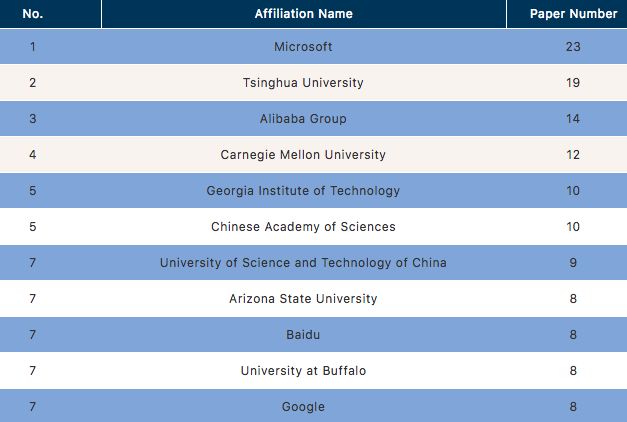
Our statistics show that six of the top 20 organizations, including Microsoft, Alibaba, and Baidu, are in the corporate world. In particular, the first Microsoft has published as many as 23 papers. This shows the influence of KDD in the corporate world. Eight of the top 20 institutions, including Tsinghua University and Shanghai Jiaotong University, are Chinese. China’s influence in international conferences cannot be underestimated.
In 2018, the top 20 authors in the number of papers published are almost all Chinese:
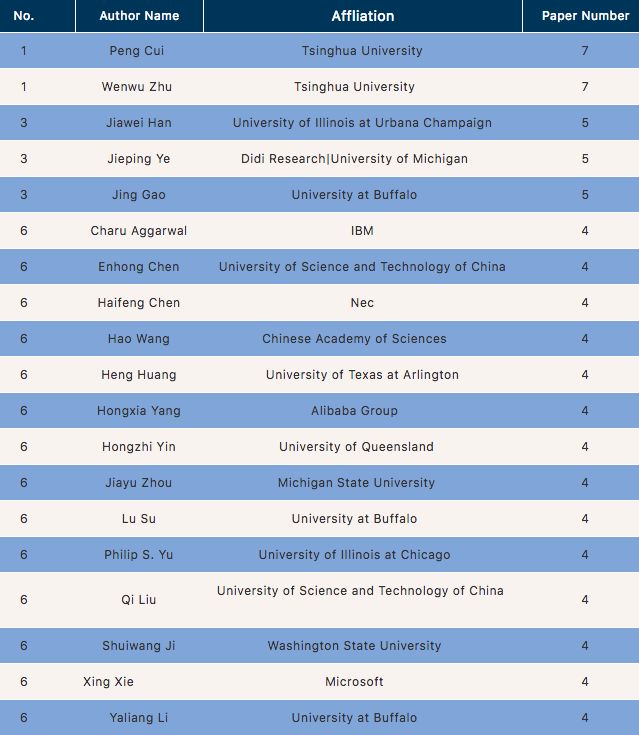

The first thing to notice is that the top 20 are almost all Chinese. Among the top 50, Chinese account for 80%. It can be seen that the influence of Chinese in academia, at least in the KDD conference. Big.
Both Professor Wenwu Zhu and Professor Cui Peng, who are tied for the first place, come from the Media and Network Lab of Tsinghua University.
Paper status: Research Track acceptance rate is only 18.4%, of which Chinese Oral exceeds 78%
KDD 2018 particularly emphasized the AI ​​development of mainstream applications, and held the KDD Cup competition on the theme of predicting air quality in cities such as London and Beijing. A total of 4173 teams participated in the competition. Among them, the Chinese team Getmax won three awards and won two firsts and one second.
The following table summarizes the number and acceptance rate of papers received in KDD 2018.

This year KDD reviewed 1440 papers, divided into two tracks, Research and Applied Data Science. Among them, Research Track reviewed 983 papers and received 181 papers with an acceptance rate of 18.4%; Applied Data Science Track reviewed 497 papers , Received 112 articles, the acceptance rate was 22.5%.
Among these accepted papers, Chinese/Chinese authors participated in Oral particularly, reaching 78.5%:
Research Track Papers Oral: 84 articles, accounting for 78.5%
Research Track Papers Poster: 43 articles, accounting for 58.1%
Applied Data Science Track Oral: 22 papers, accounting for 55%
Applied Data Science Track Poster: 40 articles, accounting for 55.6%
Chinese/Chinese authors received a total of 189 papers, accounting for 64.5%
Conference management: 20 out of 55 are Chinese, including a conference chairperson and vice chairperson
As for the most critical KDD 2018 organizing committee, among all 55 people, 20 are Chinese/Chinese.
Chairman:
Yike Guo (éƒæ¯…å¯), Imperial College
Faisal Farooq, IBM
Vice Chairman:
Tang Jie, Tsinghua University
Other main committee:
Chih‑Jen Lin (林智ä»), National Taiwan University
Xiong Hui, Rutgers University/Baidu Research Institute
Kai Sun, Imperial College
Shaking, Baidu
Huanjun, Baidu Research Institute
Li Tianrui, Southwest Jiaotong University
Zhang Ping, IBM
Zheng Yu, JD Finance
Shipeng Yu, IBM
Xia"Ben"Hu (Hu Xia), Texas A&M University
Wang Xiaoguang, Alibaba
Jiliang Tang, Michigan State University
Hang Zhang, Microsoft
Wang Wei, University of California, Los Angeles
Hanghang Tong, Arizona State University
Li Lei, byte beating
Thanks Xing, Microsoft
Ping Huang, Imperial College London
KDD Start-up Awards: Two Chinese Ixin'h
China's Smarter and Crarddix both have chu'we'mei on the list.
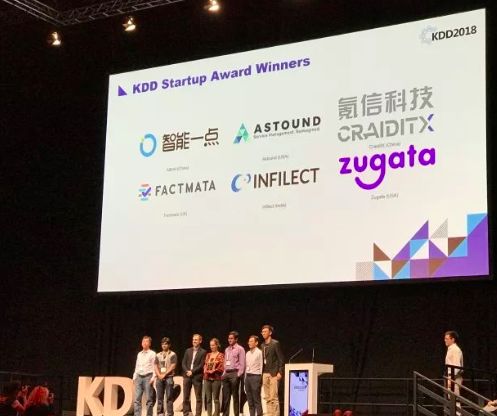
KDD CUP 2018: Chinese team Getmax wins three awards
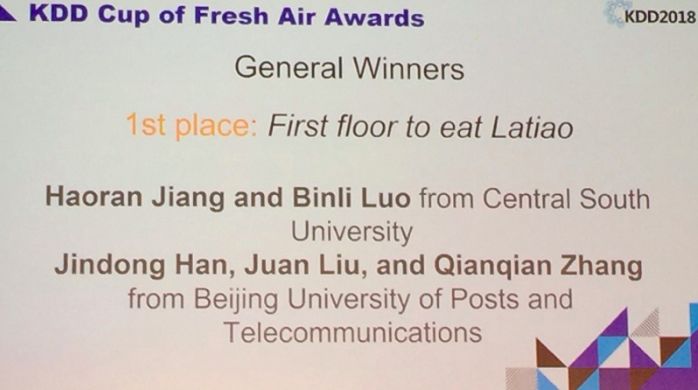
KDD CUP is known as the "Big Data World Cup", attracting engineers, developers and students from all over the world to participate. This year's topic is to predict the air quality in London and Beijing. The winning teams are shown in the picture above.
It is worth mentioning that this year the Getmax China team composed of Luo Zhipeng, Huang Jianqiang and Hu Ke won two firsts and one second, and is the only team to win three awards. Last year, the Convolution team with Getmax's Hu Ke as the captain also won the double championship of KDD CUP 2017.
Sponsors: Chinese giant technology companies and start-ups have appeared on the scene
The list of sponsors of KDD 2018 is also more interesting. The platinum levels are as follows:



The gold sponsor is ranked first by the name of a Chinese AI startup company:

Silver sponsorship:



Bronze sponsorship:



Air Humidifier,Ultrasonic Air Humidifier,Air Humidifier For Home,Mini Usb Air Humidifier
Dongguan Yuhua Electronic Plastic Technology Co.,Ltd , https://www.yuhuaportablefan.com